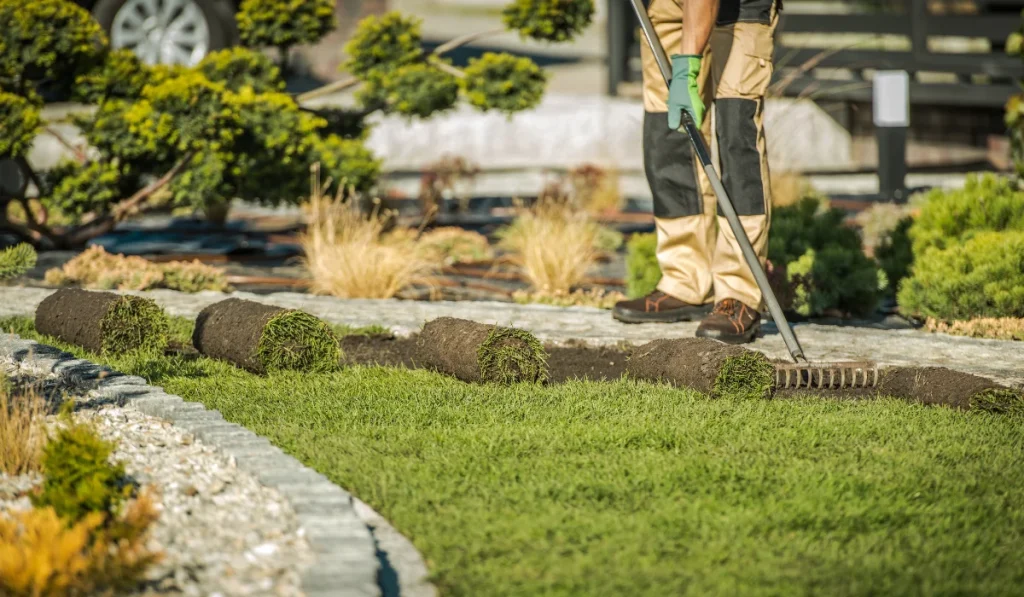Ready to give your Sacramento property a stunning makeover? Before starting construction, familiarize yourself with local landscaping requirements to avoid costly fines. Understanding regulations is crucial to enhance your yard or create an inviting outdoor space.
This article will guide you on landscape water management, fire code considerations, waste reduction, and rule exceptions.
Key Takeaways
- Ensure your landscape plans meet key regulations, like balanced planting areas, waste reduction, and fire safety compliance.
- Embrace sustainable landscaping. This practice involves managing water runoff, using permeable artificial turf, and joining the city’s garbage and recycling collection services.
- Avoid prohibited materials and actions, like using chain link and woven-wire fences in restricted areas, blowing debris into street gutters or streets, or wasting city water.
- Utilize exceptions to guidelines when relevant. For example, water runoff is allowed for rising ground waters or springs, and specific parking facilities are exempt from tree planting and maintenance requirements.
Requirements
As a Sacramento landowner, it’s crucial to consider the following municipal codes when working on your landscape or making improvements. Adhering to these guidelines helps avoid zoning violations, penalties, and potential issues.
Landscape Water Management
Water management plays a crucial role in Sacramento’s landscaping regulations, reflecting the city’s dedication to preserving the local ecosystem and water supply:
- To ensure the purity of drinking water, using approved backflow prevention devices is crucial. They prevent contamination or pollution caused by backflow and play a vital role in keeping water safe from potential irrigation system contamination.
- The irrigation system design should prevent water from reaching unintended areas, like neighboring properties, non-irrigated areas, roads, or structures. It’s crucial to avoid runoff, low head drainage, overspray, or similar conditions.
Landscape
Creating and maintaining a beautiful landscape involves various elements, such as plant choice, sod and sod care, and maintenance. It is vital to follow these guidelines to achieve a well-balanced planting area:
- When paving setback areas, you can allocate up to 50% of front-yard and street-side-yard setbacks for off-street parking, driveways, walkways, patios, and hardscape features. However, this rule doesn’t apply to the street-side-yard portion behind a fence.
- Keep front and street-side yards well-maintained with grass, flowers, shrubs, trees, or plants. Permeable artificial turf is permitted (minimum pile height: 1.25 inches; avoid placing under trees). Regularly mow, trim, and maintain grass, and avoid storing junk or debris in the landscaped area.
Prohibitions
For successful landscaping in Sacramento, knowing the limitations is crucial. Take time to understand the guidelines, balancing compliance with your landscaping goals.
Landscape Water Management
Always incorporate features that mitigate water runoff and safeguard water quality when creating your landscape:
- Never knowingly let city water used for landscaping, including new landscaping or other irrigation purposes, flow away as water waste runoff from your property.
- Don’t let city water go to waste due to leaks or faults in water lines, hoses, fixtures, or other devices without written consent from the public services director.
Landscape
When creating a landscape plan, it’s essential to prioritize not only the aesthetic appeal of an open space but also the environmental impact of your design choices:
- Blowing debris from sidewalks, hardscapes, or landscape areas into the street gutters or streets is strictly prohibited.
- You can’t use chain link and woven-wire fences in the front yard and street side-yard setback areas for single-unit, duplex, and multi-unit dwelling developments.
- Never use concertina, serpentine, barbed, razor, or other fencing materials that can cause serious physical harm. The only exception is if a court order says you have to.
Exceptions
Although Sacramento’s landscape regulations are generally non-negotiable, there are specific cases where certain exceptions may be applicable:
- Water runoff is permitted for various purposes, including rising ground waters or springs, air conditioning condensate, noncommercial vehicle washing flows, fire suppression activities (including fire hydrant flows), and more.
- Tree shading guidelines do not apply to single-unit and duplex dwellings, temporary sales office parking areas, or temporary commercial building parking areas. These facilities are exempt from the obligation to plant and maintain shade-providing trees for 50% of the parking area within 15 years of establishment.
Fire Code
Sacramento’s landscaping regulations prioritize safety and compliance with local fire code standards. These measures ensure community well-being and align landscaping practices with necessary precautions, preserving the original intent:
- Recreational fires or flammable materials should not be within 25 feet of any building. Ensure no potential fire hazards are within this radius before initiating a fire.
- To store miscellaneous combustible materials, you’ll need an operational permit. This rule includes empty packing cases, pallets, boxes, barrels, or other flammable materials exceeding 1,500 cubic feet in volume.
Waste Reduction
Sacramento prioritizes sustainable landscaping practices that promote waste reduction and hygiene:
- If you own a residential property, including mixed-use property, you must sign up for the city’s garbage collection service if you have garbage to dispose of. This rule extends to recycling services as well.
- It is prohibited for anyone to place, deposit, dump, or accumulate any yard waste on or in any street, public right-of-way or easement, gutter, curb, or sidewalk within the city unless expressly authorized to do so.
When it comes to Sacramento, embracing and adhering to these landscape guidelines allows you to design an eco-friendly and aesthetically appealing area that honors the values of the community.
To ensure you’re heading in the right direction, seeking advice from a lawn care expert can be immensely helpful in navigating regulations. By doing so, you can cultivate breathtaking outdoor spaces without any worries about compliance.



